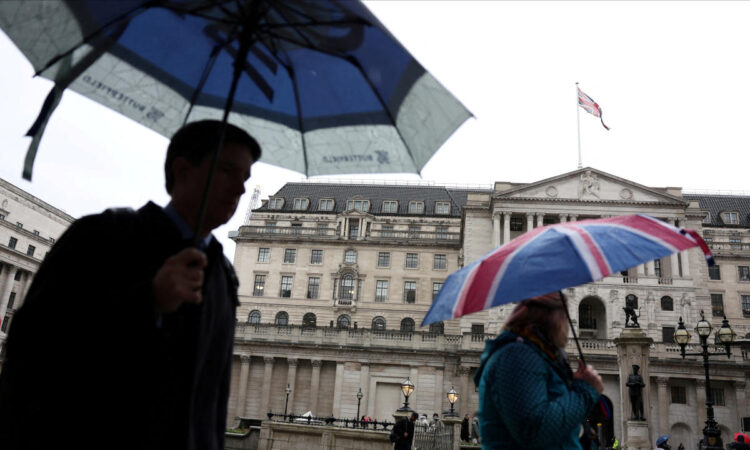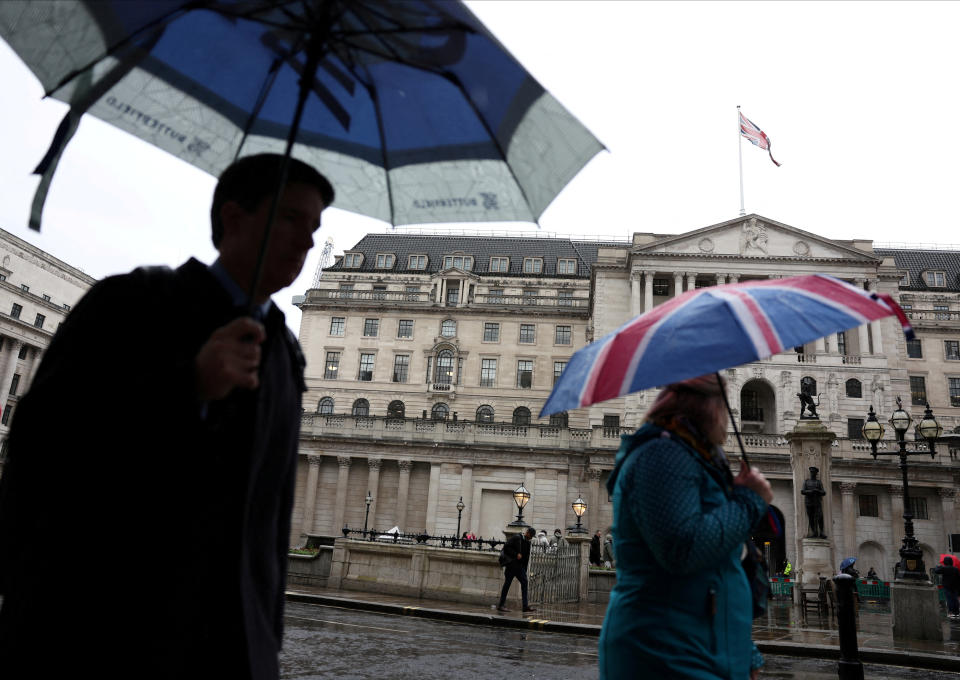

The Bank of England (BoE) is set to keep interest rates unchanged for the fifth time in a row even as new data shows inflation slowing down.
The consensus among traders is that the BoE’s benchmark rate will be kept at 5.25% when its monetary policy committee (MPC) announces its latest decision on Thursday.
Read more: The winners and losers of the new tax year
Inflation figures will be published on Wednesday morning and the headline measure of prices, the consumer price index, is expected to show a 3.5% inflation rate, down from 4% in January.
That figure is the lowest inflation rate since September of 2021.
BoE set to follow ECB and Fed
However, the data is not expected to sway Threadneedle Street to lower borrowing costs from a 16-year high as central banks around the globe err on the side of caution.
The European Central Bank kept rates unchanged this month, while the US Federal Reserve is expected to do the same later on Tuesday.
Nomura Bank noticed that central banks might be suffering from the ‘fear of going first’, with the ECB and BoE circling wagons until the US Federal Reserve cuts rates. However, they argue that both central banks can cut rates independently of the Fed.
“Market pricing for the ECB, and to a lesser extent the BoE, has been largely driven by Fed rate expectations. Market participants believe other central banks have a ‘fear of going first’, but we think the macroeconomic cycles in the US and Europe are decoupling, which justifies the ECB and BoE going it alone and cutting rates independently of the Fed,” analysts at the bank said.
Is UK inflation falling?
BoE governor Andrew Bailey said after the last MPC meeting that there had been “good news” on inflation in recent months, but that the committee needed to see more evidence that inflation will fall “all the way to the 2%, and stay there” before it can reduce interest rates.
Capital Economics has predicted that the inflation rate could fall to about 3.3%, while S&P Global Market Intelligence forecasts a rate of about 3.6%.
“Inflation looks on a downward path if the most respected economic forecasts are to be believed, but as things stand it still sits at double the Bank of England’s 2% target, and it hasn’t moved decisively downward since last November,” Laith Khalaf, head of investment analysis at AJ Bell, said.
“Combined with inflation-busting pay growth and low levels of unemployment, there’s simply no impetus for a rate cut right now,” he added.
Read more: UK mortgage arrears rise 50% amid high interest rates
Excluding bonuses, annual wage growth slowed to 6.1% in the three months to January, from 6.2% previously. Meanwhile, the unemployment rate rose to 3.9% from 3.8%, reversing a dip in the final quarter of 2023.
Deutsche Bank chief UK economist Sanjay Raja said: “Given weaker growth, weaker inflation, and weaker pay data, we think an 8-1 vote tally now looks more likely — with external MPC member [Swati] Dhingra voting for a rate cut.
“For now, we stick to our May call for the first rate cut. But our conviction levels have fallen, especially with little signalling from the MPC on when rate cuts could begin,” he added.
What to expect on Thursday?
Financial markets are pricing in only a 3% chance of a rate cut this week. Traders widely expect the first rate cut to take place in the summer, either in June or August.
“We suspect the committee will lean towards waiting another until August’s meeting before cutting rates, at which point it will have a fresh set of forecasts,” James Smith, developed markets economist at ING, said.
“That’s also what markets are now pricing, though we think the Bank will ultimately deliver a little more easing than investors expect this year. We expect four 25bp rate cuts in total in 2024,” he added.
Steve Matthews, investment director at Canada Life Asset Management, said “all eyes” will be on Catherine Mann and Jonathan Haskell’s votes this week.
Mann and Haskel, opted for an increase in rates to 5.5%, while fellow external member Dhingra called for an immediate cut. The majority voted for no change.
“If both Haskel and Mann shift to hold, it could signal that a June cut is potentially on the cards. However, they retain ongoing concerns, repeated by Mann last week, over the tight labour market and UK wage growth settlements still outpacing inflation, despite it slowing again in the three months to January. The surprising inflation data from the US last week will also be front of mind,” Matthews said.
“In turn, the market will also be looking to see if more committee members decide to join Swati Dhingra, who was the first to call for an immediate cut last month. Unless we see something seismic in Wednesday’s inflation data, we still expect Dhingra to remain an outlier, with the majority of the committee wanting to see the data get very close to and stabilise around two per cent before they join the ‘cut’ party,” he added.
The Bank of England’s monetary policy committee will announce its interest rates decision on Wednesday at noon.
Watch: Japan ends negative interest rates after eight years
Download the Yahoo Finance app, available for Apple and Android.





